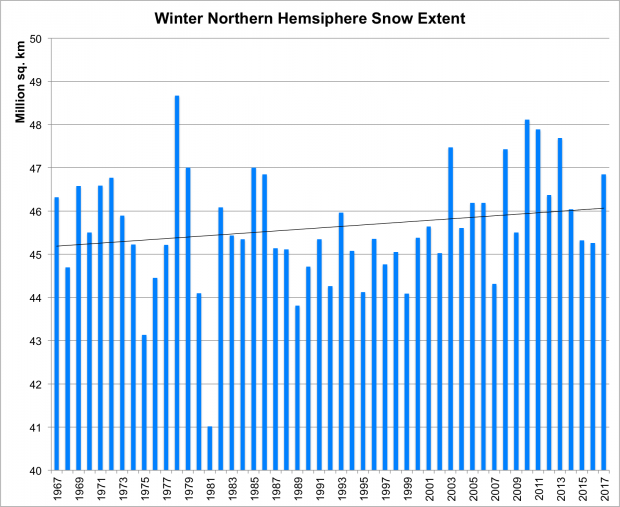Nor’easter fuels debate on whether snow means more change in climate – Morano: ‘Every weather event proves’ AGW
…FLASHBACK: NY Times Predicted The ‘End Of Snow’ In 2014
By MICHAEL BASTASCH
Peter Fox, the editor of Powder magazine, suggested “The End Of Snow?” in a February 2014 op-ed. Fox lamented the cancelation of two events at the winter Olympics in Sochi, Russia that year, and noted predictions that some cities would be too warm to even hold the winter games.
“[W]ith a rise in the average global temperature of more than 7 degrees Fahrenheit possible by 2100, there might not be that many snowy regions left in which to hold the Games,” Fox wrote for The NYT.Scientists have measured a general decrease in Northern Hemisphere monthly snow extent since 1966, but that takes into account all 12 months of the year. Though even then, snow extent has increased since the late 1980s.
…
But Northern Hemisphere winter snow extent has increased in that time. Rutgers University’s Global Snow Lab lays it out here:

Source: Rutgers University Global Snow Lab
What’s interesting is Fox wrote his article not long after Winter Storm Jonas left 30 people dead and millions more covered in up to two feet of snow in January. That winter season was one of the coldest on record, according to a meteorologist with AccuWeather.…
Winter Storm Stella Is Already Being Blamed On Global Warming
Climatologist and environmental writer Eric Holthaus couldn’t help himself. He had to link the storm to man-made global warming in a Daily Beast article. Holthaus wrote that “[t]wo studies published last year argue that climate change may be making the ingredients for big East Coast snowstorms more likely.”He’s convinced “the evidence is starting to mount: Including this storm, eight of the 10 biggest snowstorms in New York City have occurred since 1996.”
Holthaus didn’t stop with one article on the subject. He wrote a second post for the blog Grist, arguing: “We’re not just getting freak weather anymore. We’re getting freak seasons.”
Holthaus, again, trumpeted the same two studies “that provided evidence that basic weather patterns over the East Coast are getting more extreme, too, as Arctic sea ice melts and modifies the behavior of the jet stream.”
“At times, the weather pattern can get stuck in a manner that provides extra cold air from the north and extra moisture from off the ocean — which is what is happening more often now,” Holthaus wrote.…
